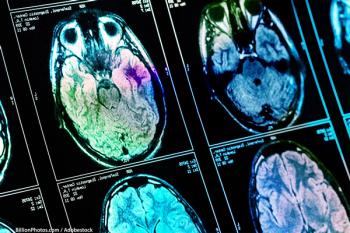
Does Pregnancy Stimulate Glioma Progression?
Pregnancy might stimulate tumor growth among women diagnosed with gliomas, according to a single-institution retrospective review of cases.
Pregnancy might stimulate tumor growth among women diagnosed with gliomas, according to a single-institution retrospective review of cases presented at the 20th Annual Scientific Meeting of the Society for Neuro-Oncology, held November 19-22 in San Antonio, Texas.
“The majority of pregnancies are uncomplicated for mother and baby, but women of reproductive age with gliomas should be counseled on the potential impact of pregnancy on tumor growth” reported Jacqueline B. Stone, MD, of the Memorial Sloan Kettering Cancer Center in New York.
Pregnant women with glioma face a high rate of cesarean section deliveries (46%) and a 25% risk of disease progression, according to the study, Dr. Stone reported.
Patients with gliomas are living longer, and the question of pregnancy “is becoming increasingly important,” Dr. Stone said.
Dr. Stone’s team retrospectively reviewed medical records from 2009 to 2014, for a total of 93 women who were either newly diagnosed with glioma during pregnancy (n = 30) or the postpartum period (n = 20), or who had become pregnant after diagnosis (n = 43 women and 56 pregnancies, because of multiple pregnancies for some women in this group). The median age for the 93 women was 33 years.
“Of the 30 women who were newly diagnosed with glioma during pregnancy, 15 or 50% presented in the third trimester of pregnancy,” Dr. Stone said. In the postpartum-diagnosis group, 70% were diagnosed in the first 3 months after delivery. Twenty-seven of these women carried the pregnancies to delivery; 12 had vaginal deliveries and 15 had cesarean deliveries. Three women terminated their pregnancies.
Of the 43 with glioma prior to pregnancy, 29 had stable disease. “However, 14 had radiographic progression on their postpartum MRI,” Dr. Stone reported. “Disease had been stable in these patients for 1 to 10 years prior to pregnancy.”
Ten women developed recurrent neurological complications during pregnancy, including seizures and headache; one woman experienced hemorrhage into a pituitary adenoma.
Four patients underwent surgical resection during pregnancy and it appears, based on that small sample, that tumor resection can take place without harm to the offspring, Dr. Stone noted.
“To our knowledge, all the babies were healthy,” Dr. Stone concluded.
The “true risks” of pregnancy for patients with glioma remain unknown, she said, and large-scale prospective studies of lower-grade gliomas should include data on fertility and pregnancy, she said. Potential mechanisms for tumor growth during pregnancy include growth factors, angiogenic factors, vascular changes, hormone influences, and immune dysregulation, she said.
The study was a retrospective review and its findings are preliminary, cautioned Dr. Stone. “Pregnancies may have been missed and patients who attempted pregnancy and were unable to conceive, are unknown,” she explained. “Spontaneous abortions are not well documented. There was no comparison group, and the number of pregnancies was relatively small.”
Newsletter
Stay up to date on recent advances in the multidisciplinary approach to cancer.






































